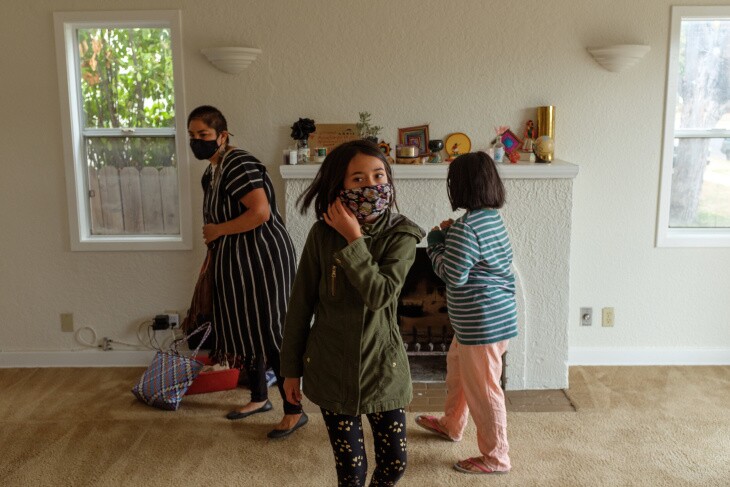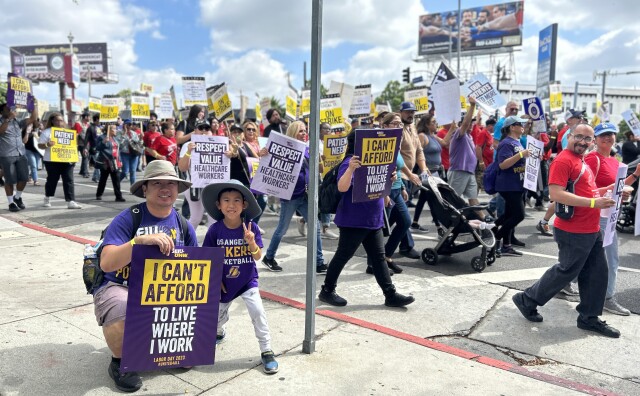Homeless Families Who Occupied Vacant El Sereno Homes Will Now Move Into Them Legally

Our news is free on LAist. To make sure you get our coverage: Sign up for our daily newsletters. To support our non-profit public service journalism: Donate Now.
In March, a group of unhoused and housing-insecure families drew national attention when they began occupying 13 vacant CalTrans-owned homes in El Sereno. Now, members of the "Reclaiming Our Homes" movement are moving into some of those properties legally, as part of an unprecedented partnership between the state transit agency and the city.
The announcement came after months of negotiations between public officials and the housing activists, who refer to themselves as the "reclaimers." The houses, which previously sat vacant, will be leased to the Housing Authority of the City of Los Angeles (HACLA) for up to three years. During that time, they'll be managed as part of the city's Transitional Housing Program, which provides temporary shelter for Angelenos as they seek more permanent housing.
The reclaimers will be allowed to live in the homes as they seek more permanent living situations.
Marta Escudero, who spent more than a year and a half couch-surfing before occupying one of the El Sereno properties with her two daughters, was one of the first reclaimers approved to participate in the program. On a recent Sunday morning, volunteers helped pack her furniture into a U-Haul so they could move it from the original house her family took over into another property down the street, which had been inspected and approved for habitation by HACLA.
Standing on the front steps of her new residence, with buzzed hair and a flowing black-and-white-striped dress, Escudero told a small crowd that she was happy for herself and her daughters, but voiced concerns for the many other Angelenos who are still unhoused or living in inadequate housing amid the COVID-19 pandemic.
"I want to emphasize that housing is a health issue, and we are having a health crisis right now in this pandemic," said Escudero. "We need to act faster to occupy all of these vacant homes, not only owned by CalTrans, but by LAUSD, the city, and throughout the whole state."
Escudero and her fellow reclaimers cited the pandemic -- and their desire to comply with the city's Safer at Home orders -- as one of their primary reasons for occupying the El Sereno homes back in March. They've been pushing for state and local officials to use these houses -- as well as other publicly owned properties -- to shelter for some of the more than 65,000 people currently experiencing homelessness in Los Angeles County.

CASTOFFS FROM AN ABANDONED FREEWAY PLAN
The homes they moved into were just a handful of 460 properties that CalTrans bought in El Sereno and Pasadena throughout the 1950s, '60s, and '70s to make way for a now-abandoned plan to extend the 710 freeway. While the transit agency has started to offer up some of these homes to current tenants at affordable prices or to non-tenants at market value, as required by state law, only a few have been sold. According to a 2019 investigation by the Pasadena-Star News, approximately 163 of the properties remain vacant.
Roberto Flores is an organizer for United Caltrans Tenants, which advocates for residents who have been impacted by the 710 freeway initiative. Flores said that many of the homes have been neglected over the years, and the agency has done little to assure the housing remains affordable.
"For the last 30 or 40 years, CalTrans has been a slumlord, and has damaged and hurt the community fabric," he said.
Flores has worked closely with the reclaimers in recent months, and said the group's official negotiations with the city began in March, after Mayor Eric Garcetti expressed an interest in finding a solution for the activists during one of his daily COVID-19 press conferences.
Following numerous meetings between city and state officials, the reclaimers, and HACLA, it was decided that 22 homes would be rented out to HACLA under a master lease, and that all 13 of the original reclaimers -- and potentially two who joined the movement in April -- would be admitted into the city's Transitional Housing Program.
Flores also said that some of the restrictions typically placed on participants in the Transitional Housing Program, such as visitation regulations, would be altered or eased.
"These folks are not squatters, these folks are reclaimers, reclaiming their community for the community," he said. "The program had many restrictions that this organized, conscious group of people did not need or appreciate."
A UNIQUE USE FOR SINGLE-FAMILY HOMES
Jenny Scanlin, chief development officer at HACLA, said that using single-family homes as transitional housing is highly unusual in L.A. -- typically, this type of program is run out of an apartment building or communal living space, with onsite management and security.
"These [houses] are scattered sites in the middle of neighborhoods," said Scanlin. "It's a very, very unique concept, and we are excited to see this through and make it work."
Scanlin said that participating reclaimers will be required to undergo eligibility screenings and background checks, and will receive case management and wraparound services from People Assisting The Homeless (PATH) for the duration of their stay.
The objective of the program, Scanlin said, is to give participants time to stabilize their incomes and to connect them with opportunities to find more permanent housing. If some of the participants secure affordable or subsidized housing, there is the potential to fill the units with other unhoused tenants.
"Our goal is to rotate people into these units as much as possible, make them as available as possible in the time that we have them," Scanlin said. "We want to have them continuously filled."
However, the reclaimers have a different end goal in mind. Activists say that since the beginning, the group's objective has been to permanently return these houses to community ownership, and that they would ultimately like to see them transferred to the El Sereno Community Land Trust.
Escudero said that this would not only help prevent gentrification in the neighborhood, it would allow the reclaimers to maintain the strong support system they've developed among each other.
"We want a more long-term plan, we don't just want to be in transitional housing" said Escudero. "Once you build community in a place, it's really stressful and difficult to move around."
COMMUNITY LAND TRUSTS -- WHAT ARE THEY?
Community land trusts, which are nonprofits that hold land on behalf of a specific community, have played a role in similar movements to reclaim vacant housing across the U.S. in recent months.
In October, a house that was occupied by the Oakland group Moms 4 Housing was sold by the real estate speculator Wedgewood to the Oakland Community Land Trust for $587,500, and will now be converted into transitional housing for homeless mothers. In September, the city of Philadelphia agreed to transfer 50 vacant city-owned homes to a land trust set up by Philadelphia Housing Action, an activist group representing homeless mothers and children, following months of housing takeovers and protests.
It remains to be seen if and how this kind of transfer could happen with the 22 homes currently being leased to HACLA, but Scanlin said the state is "very much supportive" of returning some of the CalTrans-owned homes back to the community.
"I think that they are really trying to activate their ability to get these homes into the hands of the folks that are living in them now as tenants ... if the tenants want to become owners through that particular process," she said. "And for those vacant homes, I think they're hoping to establish a program where they can release them to responsible housing agencies, which can very well include non-profits, land trusts, and lots of local stakeholders."
As for Escudero, she said that while the reclaimers are hashing out their next steps, she's happy to be enjoying at least some semblance of security in her new home.
She's been working on setting up a homeschooling station for her daughters and their peer group in her garage, and has helped to launch a seed library with the nearby El Sereno Community Garden.
"I'm really excited about having a little more stability, knowing that it's not illegal and I'm not a reclaimer anymore," Escudero said. "I'm leasing now, and this is where I'm going to stay for a while."
WE LOVE TO ANSWER YOUR QUESTIONS
-
After San Gabriel's city council rejected the proposal as "too narrow", one city councilmember argued the entire DEI commission, created in the aftermath of George Floyd's murder, had "run its course."
-
A medical industry challenge to a $25 minimum wage ordinance in one Southern California city suggests health workers statewide could face layoffs and reductions in hours and benefits under a state law set to begin phasing in in June. Some experts are skeptical, however, that it will have such effects.
-
Sandhill cranes are returning to the Lake Tahoe basin after a century long hiatus in what many say is a conservation success story.
-
The Dodgers fired Mizuhara in March after Ohtani's lawyers accused him of stealing millions of dollars from the baseball player to place bets with an Orange County-based bookie.
-
Jackie’s partner, Shadow, refuses to abandon their unviable eggs, despite her attempts to nudge him along.
-
Big Sur's Highway 1 was built to maximize the breathtaking views of the cliffs and ocean at the cost of the road's longterm stability.






